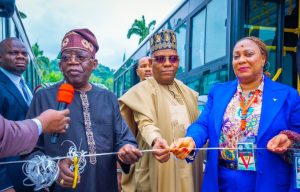Tinubu Launches 30 Hybrid Buses for Sustainable Transport
In a significant move towards transforming Nigeria’s transportation landscape, President Bola Tinubu inaugurated 30 hybrid Compressed Natural Gas (CNG) buses on August 12, 2024. This initiative aims to alleviate the challenges faced by commuters while promoting eco-friendly solutions. The unveiling of these buses, manufactured by Innoson Motors, a leading Nigerian automotive company, represents a substantial step forward in reducing the carbon footprint of public transportation in Nigeria.
Addressing Urban Transportation Challenges
The introduction of these buses comes at a time when urban transportation in Nigeria grapples with numerous challenges. Issues like traffic congestion, high fuel costs, and environmental pollution persist. By opting for CNG as the primary fuel source, the government addresses these pressing issues. This choice also aligns with global trends towards greener energy solutions. During the inauguration ceremony held in Abuja, President Tinubu emphasized the importance of energy innovation in driving economic prosperity and enhancing the quality of life for Nigerians.
“These hybrid buses are a game changer for our transport sector,” Tinubu stated. He highlighted their potential to improve the daily commute for thousands of Nigerians. Each bus can carry 100 passengers, significantly increasing public transport efficiency. The CNG buses provide a cleaner alternative to traditional diesel-powered vehicles. Diesel vehicles are notorious for their contribution to air pollution and greenhouse gas emissions.
Improving Commuter Experience
As urban populations continue to grow, the demand for reliable transportation solutions has never been greater. The introduction of the hybrid buses directly responds to this need. Commuters traveling from the outskirts of Abuja to the city center can expect smoother and more efficient journeys. The enhanced capacity and reduced operational costs associated with CNG-powered buses make this possible.
Moreover, this initiative is expected to create job opportunities within the local automotive industry. Innoson Motors will ramp up production to meet the growing demand for hybrid vehicles. This not only supports local manufacturing but also contributes to economic growth. The government’s commitment to supporting local businesses is evident in this project, empowering homegrown solutions to national challenges.
Economic Benefits and Accessibility
In addition to improving transportation efficiency, the hybrid buses are poised to reduce commuting costs for Nigerians. With rising petrol and diesel prices, CNG offers a more affordable alternative. This economic benefit is crucial for low-income families who depend on public transport. By making transportation more accessible, the government enhances the overall standard of living for its citizens.
Transitioning to CNG-powered buses also aligns with Nigeria’s broader environmental goals. As the country grapples with climate change effects, initiatives like this are essential for promoting sustainable practices. CNG is not only cleaner but also more efficient. It produces fewer emissions compared to conventional fuels. This shift towards greener transport options reflects a growing recognition of the need to protect the environment for future generations.
Future of Nigeria’s Transportation Sector
Furthermore, the launch of these buses is part of a larger vision for Nigeria’s transportation sector. Plans include expanding the public transport network and enhancing infrastructure. The government aims to integrate these hybrid buses into a comprehensive transport system. This system will include rail and road networks, providing seamless connectivity for commuters. Such a holistic approach is crucial in addressing the multifaceted challenges of urban transportation.
As the world increasingly embraces sustainable practices, Nigeria’s commitment to hybrid transportation solutions positions it as a leader in the region. The successful implementation of this initiative could serve as a model for other African nations facing similar transportation challenges. By prioritizing eco-friendly solutions, Nigeria addresses its immediate transport needs and contributes to the global fight against climate change.
Conclusion
In conclusion, President Tinubu’s inauguration of the 30 hybrid CNG buses marks a significant milestone in Nigeria’s transportation evolution. This initiative promises to enhance commuter experiences, reduce environmental impact, and stimulate economic growth through local manufacturing. As the country moves forward, the success of this project will depend on continued investment in sustainable transport solutions. The commitment of all stakeholders to embrace innovation is vital for a better future.


